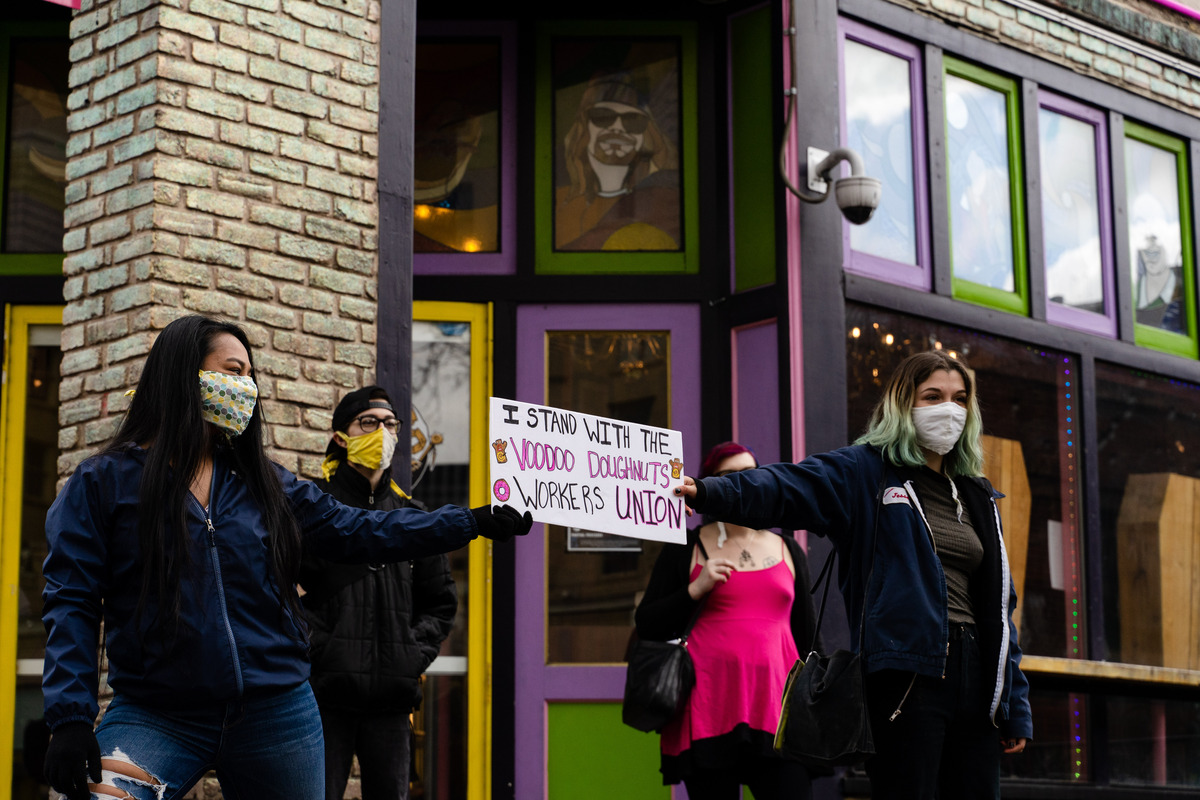Days after Governor Brown announced a state-wide stay-at-home order closing all non-essential businesses, Voodoo Doughnut Workers Union (VWU) gathered to support laid-off workers collecting their final paychecks outside the shop’s Old Town location.
The sit-in came six days after Voodoo Doughnut employees announced they were unionizing on March 20, after concerns over safety at the downtown location were raised. Crime is a consistent problem for the Old Town location, which was recently robbed by a man with a hatchet. The union stated in their announcement they were “fighting hard for a living wage, severance pay, access to accrued PTO [paid time off], hazard pay and adequate security at the Old Town location in Portland.”
“Today, in solidarity with Voodoo Doughnut Old Town workers who were laid off in the last few days, we came in to pick up our final checks,” said Katherine Nadj, a long time employee at the company. “[While] making sure to comply with CDC regulations during the COVID-19 crisis, and equipped with hand sanitizer and homemade masks, workers filed in six feet apart and one at a time.”
“We were denied access to our own personal effects we had stored in the back of the shop and were told to email the general manager. We were told the discrepancies regarding missing PTO and any other concerns should be redirected to our general manager by email.” The general manager for the Old Town location did not immediately respond when asked to comment.
Other service industry businesses and employees face similar challenges. Crush, a long time Portland LGBTQ+ bar and club, recently laid-off all 27 of its employees in preparation for its forced closure due to COVID-19, according to an article by Eater Portland. As employees were allegedly denied reimbursement of their accrued PTO and sick leave, 12 of the former employees staged a 24-hour sit-in at the bar, but were dispersed by police after an hour.
Two days after the sit-in on March 21, management at Crush provided the former employees with accrued sick time checks. However, other demands—such as guaranteed rehiring of laid-off employees—were not met, according to the newly-formed union Crush Bar Workers Collective.
Meanwhile, the Burgerville Workers Union (BVWU) held a one-day strike on March 22 at the burger chain’s 92nd street location, according to an article by Eater Portland. The BVWU stated their reason for the strike in a Facebook post; “Corporate has stripped the 92nd and Powell location down to a skeleton crew, making it impossible to keep up necessary sanitary standards while working during a pandemic.”
Instacart, a service that provides proxy shopping, is also feeling pressure from workers during the pandemic. According to CNN, Instacart workers are planning a strike on March 30 over safety concerns related to COVID-19, asking for personal protective equipment and hazard pay.
“In a show of disrespect to employees, the company refused to respond to concerns of workers or even to discuss them,” stated Samantha Bryce, a Voodoo Doughnut employee, in a Facebook post by VWU about the sit-in. “We need positive responses to our issues, and we need voluntary recognition to address our concerns at the table.”
On March 13—ten days prior to VWU’s announcement to unionize—Voodoo doughnuts management released a statement: “Our customers, employees and the communities we serve will always be our top priority.”
As responses to the COVID-19 pandemic increase pressure on the U.S. economy, workers face unprecedented uncertainty as the deadline for rent and other bills approach.
“Some businesses may be continuing to operate right now at significant losses either because they are hoping for a relatively quick return to normality, or because they are reluctant to layoff employees,” stated Rajiv Sharma, professor of economics at Portland State. “As the crisis drags on, both of those become harder to sustain. Furthermore, demand is likely to decrease more as the crisis drags on which also makes it more likely that currently operational businesses will shut down.“
According to Oregon Public Broadcasting, nationwide unemployment claims reached more than three million during the week of March 15, with 76,500 claims in Oregon alone. Of the 76,500 claims, 10,700 came from workers in the leisure and hospitality sector. However, these numbers could be higher as the U.S. Department of Labor sent out guidance for state agencies to withhold specific unemployment numbers, as per an email obtained by The New York Times.
